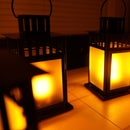Introduction: French Cleat Tool Storage
Drawers are where stuff goes to die. You put something in and before you know it other stuff starts piling on top of it and what you first stored is out of sight and out mind. This applies for tool drawers too, unless there are specific cutouts for each tool, the tools just get in a mangled mess usually.
I needed a way to store my hand tools that would be give me the most amount of utility. I don't get much time out in my shop so when I do get a chance to work on some projects I want to make sure I am the most productive I can be. I want to spend my time working and not looking for tools. At a quick glance I can see the tools and grab the one I need with out moving stuff out of the way.
I could buy some shelving but couldn't find anything that I could customized to my liking. So I came across a Pinterest post for French cleat shelving, I figured I could apply it to storing tools as well.
What I like about this system is it's versatility, you can build the shelves to match the size of your tools or make custom size shelves. I have some tool holders and some shelves.
Step 1: Materials and Tools
Materials:
So I made this whole system from left over plywood (various thickness) and some strapping. The cost of the system is cheap, just some lumber and screws not counting the tools needed.
Tools:
- Tablesaw
- Circular saw
- Drill / Driver
- Hole saw or step drill bit
Step 2: Build Video
Check out the build video too!
Step 3: Building Process
First thing is to make the strip that will mount to the wall. This is the base to the whole system. To make the strip run a 45 degree cut along one edge of a piece of strapping.
To make the shelves I used left over plywood from another project, I think the top of the shelf is a piece of 5/8" or 3/4" but really it can be anything as long as it works for you. The cleat part of the shelf is a piece of strapping cut at a 45 degree angle about 1 1/4" wide, as long as this piece matches the strip on the wall you should be good. Screw the top into the cleat.
Then a piece of 1/4" plywood is used to face the front of the cleat, this keeps the shelf stable when it's installed.
The pictures makes everything clear and is pretty self explanatory.
Holes were drilled in some of the shelves and others were made into actual shelves to hold small items or bottles. Best part if you don't like the configuration or need to change it up to suit the needs of a particular project you can move them around or make new ones with little effort.
If you are worried that the shelves might fall off the wall, you can always use a screw to fasten the face to the wall cleat.
This was a really easy project and cost me almost nothing in materials since I used scrap that I had lay around.





